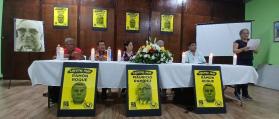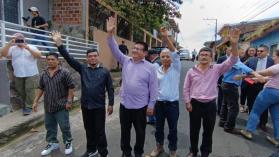El Salvador Apologizes For State Violence on 20th Anniversary of Peace Accords
On January 16, crowds gathered in the small community of El Mozote, where, in 1981, the Salvadoran Armed Forces killed more than 1,000 civilians, primarily children, to commemorate the 20th anniversary of the signing of the Peace Accords that ended El Salvador´s 12-year Civil War. At the solemn event, President Funes named the military officers implicated in the horrific massacre and asked for forgiveness from the victims and the Salvadoran people on behalf of the State. He announced a series of reparations for victims and their families – from physical and mental health services to an economic development plan for El Mozote. Funes also committed to updating public school curricula as well as police and military training materials to acknowledge the history of human rights violations by the armed forces. Funes is the first president in Salvadoran history to acknowledge the crimes against humanity committed by the government during the civil war that resulted in 75,000 civilian deaths. However, the prosecution of the responsible actors is prohibited by an amnesty law approved in 1994 by the right-wing parties five days after the release of the U.N. Truth Commission report, which attributed 85% of civilian deaths to the armed forces and 5% to the Farabundo Martí National Liberation Front (FMLN). As part of the 20th anniversary commemoration, President Funes also participated in a forum of ex-guerrilla combatants to unveil a new government program to ensure that veterans of both the FMLN and the armed forces receive benefits; benefits to FMLN combatants was one of the agreements of the Peace Accords that was largely sidelined by the right-wing administrations that held power from 1994 to 2009. Perhaps the most popularly recognized victories of the Peace Accords were the end of over 60 years of military dictatorship and the opportunity to create a viable democracy. “The Peace Accords created a new political process, one in which all would have a chance to participate,” said FMLN member José Nuñez. The FMLN’s presidential victory in 2009, and the fact that the FMLN currently holds the largest number of seats in the Legislative Assembly, is a testament to the effective implementation of this pillar of the Peace Accords, through which the FMLN first became a political party. Other major pillars that were successfully implemented include the dramatic reduction of the Salvadoran armed forces and elimination of several of its most repressive wings, including the National Guard. In the Accords, the role of the armed forces was strictly limited to the defense of national territory and sovereignty, while the broader concept of security, including “economic, political and social aspects which go beyond the constitutional sphere of competence of the armed forces,” became the “responsibility of other sectors of society and of the State”. To this end, the Peace Accords created a new institution, the National Civilian Police (PNC), to be composed of former soldiers, demobilized FMLN combatants, and civilians. However, in the past five years, the strict lines between the armed forces and public security have started to blur. President Saca (2004–09) was the first to send soldiers to the streets to assist the PNC, a protocol that Funes has continued. Recent changes in Funes’s security cabinet threaten to undermine the ideological separation between the military and the police, as does the influence of increasing U.S. security aid to Central America (see page 1 for more). Beyond the challenges of organized crime and impunity, the new government in El Salvador must contend with abiding social inequality, as the economic agreements of the Peace Accords were effectively ignored over the last 20 years. Though Funes and the FMLN have taken steps to fulfill these long-overdue commitments—for example, legalizing the transfer of over 17,000 land titles to campesinos—only recently has the new government been able to initiate structural economic change, including passing the first progressive tax reform in decades (see page 6 for more). The gains made by the FMLN in the March legislative and municipal elections will in part determine the possibility for passing more expansive legislation “to realize the people’s hope to build a better and more dignified life,” for which Vice-President Sánchez-Cerén called during the FMLN’s own Festival of Peace to commemorate the anniversary.

 "I am a CISPES supporter because continuing to fight for social justice and a more people-centered country means continuing the dream and sacrifice of thousands of my fellow Salvadorans who died for that vision.” - Padre Carlos, New York City
"I am a CISPES supporter because continuing to fight for social justice and a more people-centered country means continuing the dream and sacrifice of thousands of my fellow Salvadorans who died for that vision.” - Padre Carlos, New York City

